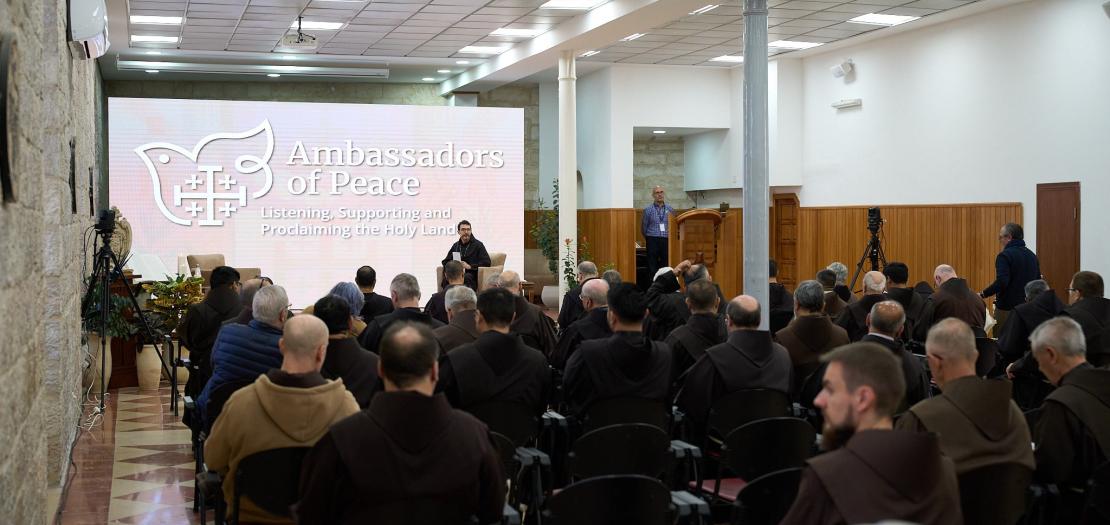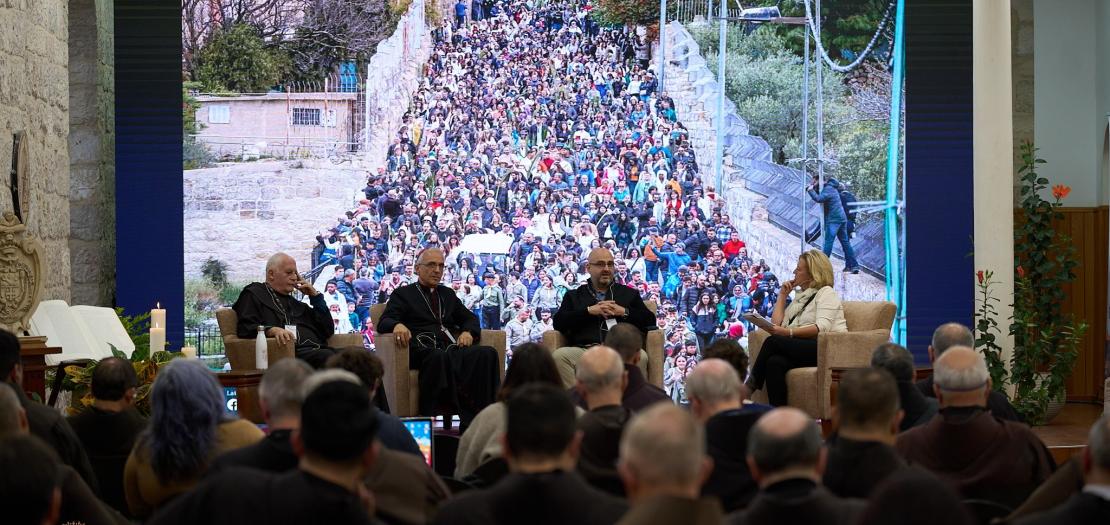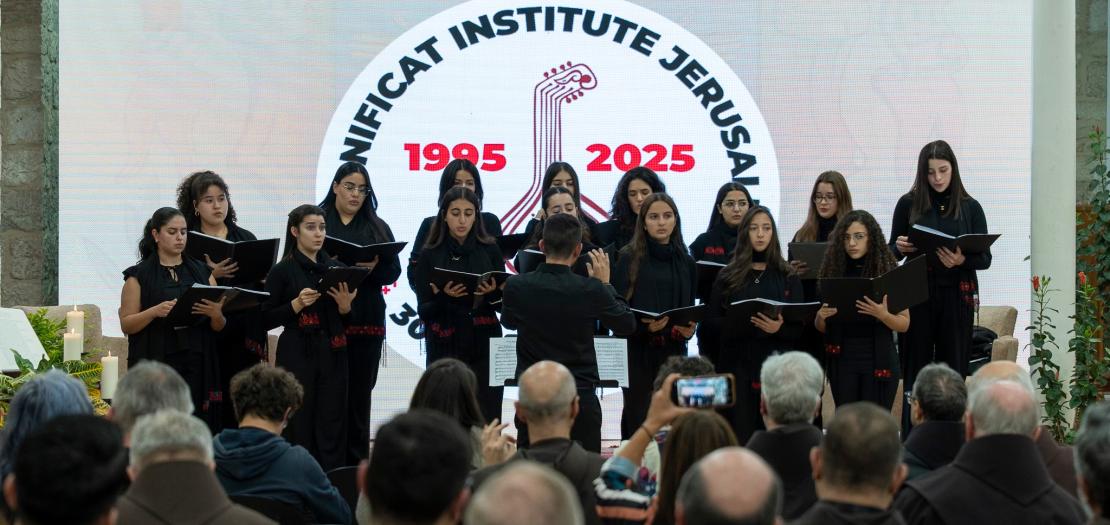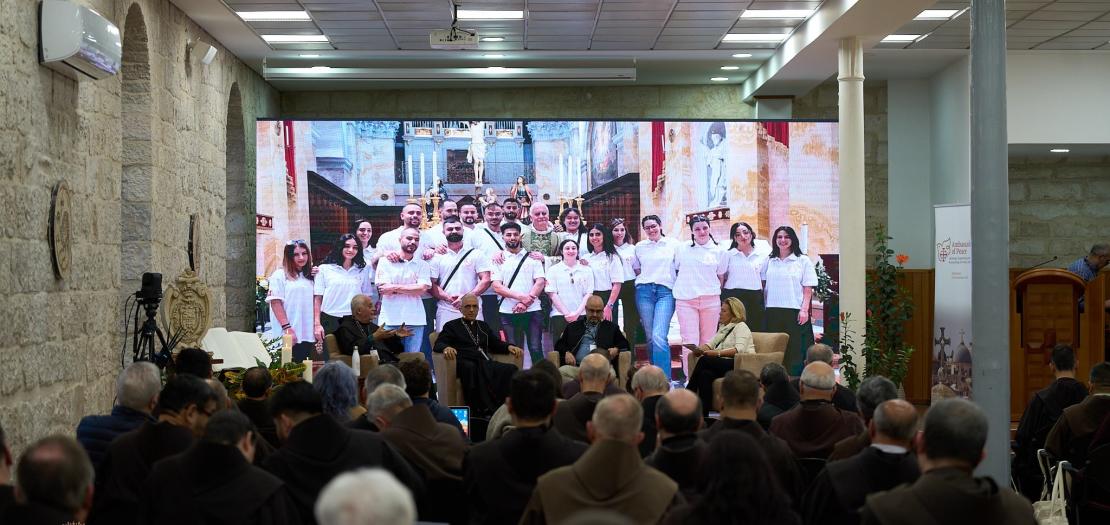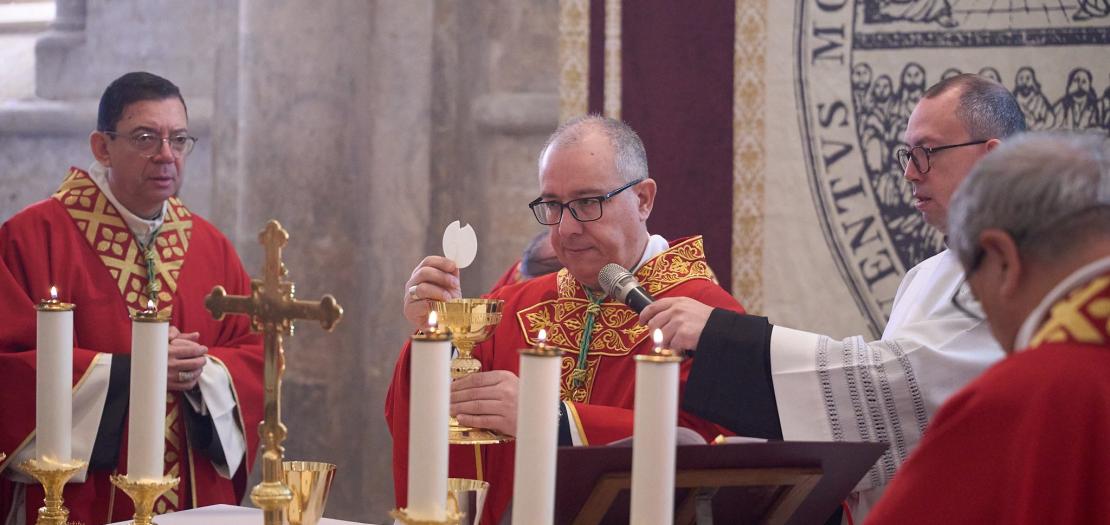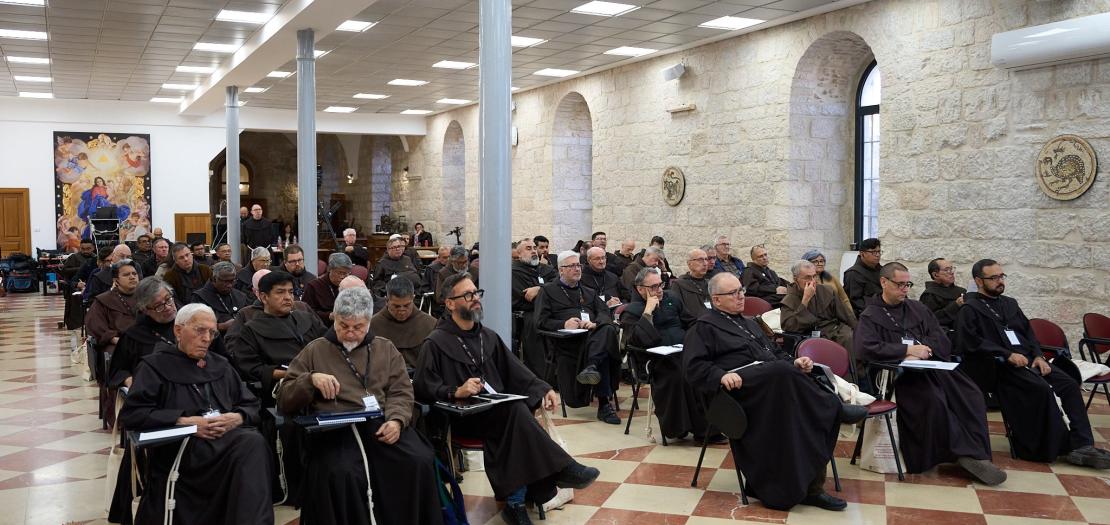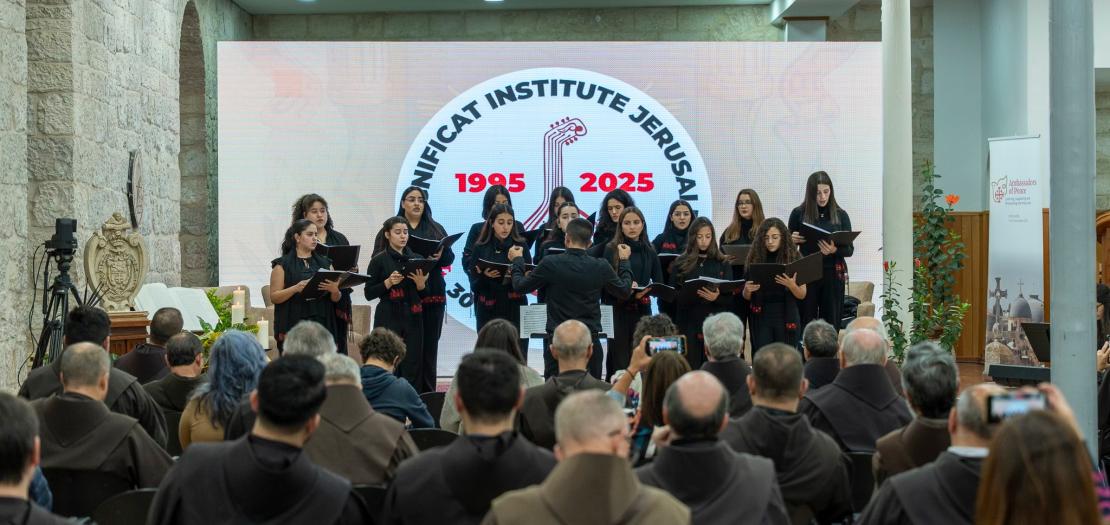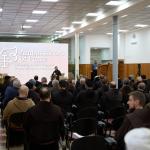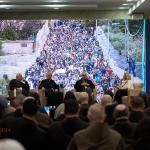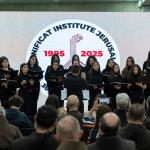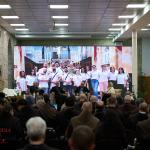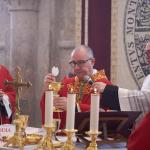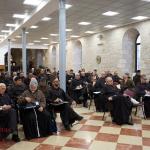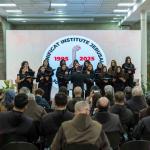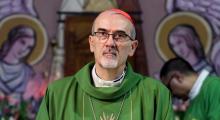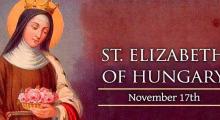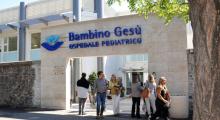Issued by the Catholic Center for Studies and Media - Jordan. Editor-in-chief Fr. Rif'at Bader - موقع أبونا abouna.org
The Fifth International Congress of the Commissaries of the Holy Land began today, November 19, 2025, under the title "Ambassadors of Peace, listening, supporting and proclaiming the Holy Land". There are 75 commissaries present, accompanied by collaborators and journalists, coming from 38 countries of every continent, from Ecuador to Canada, from Bolivia to Poland, from Peru to Mexico, from Panama to Singapore, to Croatia, South Africa, El Salvador, Brazil, the Philippines, Paraguay, Australia, Indonesia and many others. A truly global representation, a living sign of the universality of the Franciscan mission.
The opening day was full of appointments, common prayer, testimonies, accounts from the territories, moments of dialogue and the first workshop sessions, designed to foster a shared reflection on the mission of the commissaries.
The celebration in the Cenacle, presided over by the custos, officially opened the congress, recalling those present to openness in listening and a commitment to supporting the Holy Land in this complex time.
Back at the Convent of Saint Savior, the participants then gathered in the Immacolata Hall for the introductions, with contributions by Fr. Matteo Brena, Commissary and president of the organizing committee, Fr. Rodrigo De La Fuente, director of CLIO, along with the opening reflections of the custos, which outlined the meaning and objectives of these days of work.
Introductions
The International Congress of the Commissaries of the Holy Land opened with an intense and prayerful liturgy led by the custos, Fr. Francesco Ielpo, who invited the assembly to invoke the Holy Spirit, to "prepare to listen to the Word" and to recognize the light of God that "knows no darkness". In his greeting, the custos expressed gratitude for the often-silent service of the commissaries, encouraging them to live these days as a time of communion and renewed enthusiasm for a shared mission, listening, understanding and supporting the Holy Land in the present time.
In this spirit came the intervention of Fr. Matteo Brena, who recalled how the congress represents the first major moment of encounter after years of forced distance, saying "We need to find each other again, to be together", retracing the difficulties experienced - between pandemic and war - and highlighting the common desire to rebuild relationships and collaborations. Fr. Brena also recounted the genesis of the congress, "organized in a short time but with heart", reviving an idea cultivated in previous years and relaunched despite the uncertainties of the period, to give breath again to the mission of the commissaries as "ambassadors of peace" listening to the Holy Land.
Finally, connecting from Italy, Fr. Silvio Della Fuente intervened, bringing a greeting filled with gratitude and memory of the shared work of recent years. He assured his spiritual closeness to the commissaries and expressed the hope that this congress may be a fruitful time of listening, discernment and renewed impetus for the Franciscan mission in the world.
Father Gabriel Romanelli, reporting from Gaza
Among the most intense moments of the first day was the link with Father Gabriel Romanelli, parish priest of the Latin Catholic Parish of the Holy Family in Gaza, the only Latin community present in the Strip. Argentine, originally from Buenos Aires, priest of the Institute of the Incarnate Word, Father Gabriel has lived and worked in Gaza since 2019, after a long experience in the Middle East, during which he learned Arabic in Egypt and taught philosophy at the Patriarchal Seminary of Beit Jala, near Bethlehem.
In his intervention he offered the commissaries a realistic and painful picture of the humanitarian and spiritual situation experienced by the population and the small Christian community under siege. He recalled how, in recent months, the parish has become not only a place of worship but also a refuge for displaced families, the sick and children of every religion, becoming one of the few relatively safe spaces during the bombings. Marked by grief and destruction - the parish was struck by a bomb last July - the community continues to bear witness to an "unshakeable" faith and a hope that, as Fr. Gabriel emphasized, is born from being close to one another and from feeling the support of the universal Church.
Father Romanelli focused particular attention on the phenomenon of forced emigration, a deep wound that has marked the Christian community of Gaza for years. Many, he explained, are forced to leave the Strip for economic or health reasons, or simply to guarantee a future for their children, and this slow but steady diaspora risks dissolving a historical and precious presence. However, alongside those who leave, there is a nucleus of faithful who choose consciously to remain, even amid bombings, shortages of basic goods and daily uncertainty.
They are families, elderly people, young people and volunteers who decide to stay "to guard their own land, their own community and their own faith", transforming the parish of the Holy Family into a place of spiritual resistance and tireless service. Fr. Gabriel emphasized that this choice is not born of recklessness but of a profound conviction, to be a sign of hope for those who cannot leave and to witness that, despite everything, life continues.
The community of Cyprus and Lebanon: testimonies
Another particularly rich moment of the congress was dedicated to the testimonies coming from Cyprus and Lebanon, two realities that, though different, share pastoral challenges, social fragility and a strong need for accompaniment.
For Cyprus, Mons. Bruno Varriano, OFM, auxiliary bishop of the Latin Patriarchate of Jerusalem and patriarchal vicar for the island since 2022, intervened. A Franciscan, former rector and guardian of the Basilica of the Annunciation in Nazareth, Varriano recalled how his is the first Latin episcopal presence after nearly four centuries, a sign of rebirth for a Church deeply marked by linguistic plurality, migrant mobility and the still open wounds of the division of the island.
He described a growing community, supported by five parishes - one of which was recently erected in the occupied territory - and composed of faithful coming from the Philippines, Sri Lanka, India, Europe and the Middle East, a true "bridge Church", called every day to generate dialogue between cultures and confessions. Varriano emphasized the importance of healing and reconciliation, recalling how today relations with the Orthodox Archbishop and the other Churches are marked by collaboration despite inevitable tensions, saying "We must educate the new generations to love the Orthodox".
From Lebanon came the passionate voice of Mons. César Essayan, apostolic vicar of Beirut for Latin Catholics. His intervention offered with clarity the dramatic nature of the historical moment of the country, caught between an unprecedented economic collapse, political paralysis and a growing emigration that empties schools, parishes and families.
Essayan spoke of the struggle to accompany a population deeply tried and at the same time of the extraordinary resilience of the Christian community, which continues to serve through schools, listening centers, charitable works and formation programs. In particular, he highlighted the desire of young people for a deeper theological and spiritual formation, a sign - he said - that even in the deepest crisis a "hunger for the future" can be born. His words offered those present a sincere, concrete and profoundly human glimpse of a Middle East that suffers yet does not renounce hope.
Being peacemakers in the Land of Wounds: The afternoon meeting
n the heart of a conflict that has now lasted for two years and has left the whole Holy Land in a climate of fear, suspension and division, the congress gave voice to the "living stones", the local Christians who live the tensions and wounds of this land every day. The panel moderated by Alessandra Buzzetti, correspondent of TV2000, brought together Mons. Rafik Nahra, patriarchal vicar for Galilee, Fr. Amjad Sabbara, parish priest in Jerusalem and now in Nazareth, and Elias Habash, head of the Latin Scouts of Jerusalem. Their interventions outlined a painful but also rich and hopeful picture, marked by the awareness that Christians still have a fundamental mission, "to unite and not divide".
Mons. Nahra described with clarity the weight of the war on Christian communities, especially Arab Christians, who live a double fragility, a minority in Israel and also a minority within the Arab world. Among young people, he explained, a true identity crisis has opened, "Many no longer know who they are, Israelis, Arabs, Palestinians, Christians, everything becomes confused". To this is added daily fear: damaged relationships at work, difficulties in expressing oneself, mutual distrust, even the fear of speaking Arabic in the street. Not surprisingly, many have chosen to leave cities such as Nazareth or even the country, driven by a growing sense of precariousness.
Alongside this uncertainty, Christian Scouts represent a space of breath and resistance for many young people. Elias Habash, who lives and leads the group in the heart of the Old City of Jerusalem, recounted the confusion of young people: "They can no longer imagine the future, their studies, work, marriage, everything has stopped". Facing this existential block, the Scouts decided to multiply their efforts: activities, camps, music, sports, weekly meetings. In the Scout headquarters mobile phones are put aside for a few hours, to avoid being overwhelmed by violent or propagandistic images coming from social media. "It was not easy" said Habash, "but we have become a family".
Fr. Amjad Sabbara recalled another crucial dimension: the Christian choice of meekness. In a context where every word can be misunderstood or punished, where polarization has become the daily language, the friar reminded that meekness is not passivity: "It is not weakness but the refusal of violence and falsehood". Living meekness means visiting families, accompanying those who are afraid, supporting those who have lost their job or are thinking of emigrating, and above all continuing to transmit the faith as a stable root in the midst of chaos. Emblematic is the spontaneous gesture of the Christian community of Jerusalem which, in full war, gathered aid for the faithful of Gaza, a concrete way of being "like the good Samaritan".
Despite the climate of closure and suspicion, examples of dialogue and collaboration are not lacking. Mons. Nahra recalled Israelis who protect Palestinian farmers from settler attacks, or school and interreligious programs that, at least in relatively calm times, allow young Arabs, Jews, Druze and Christians to meet. "There are people ready to work together. We must create opportunities", he affirmed. Habash also recounted joint initiatives between Christian and Muslim Scouts, or exchanges with groups from the West Bank: "We are open, and that is our strength", he said, while acknowledging that the war has made everything more difficult.
In his final appeal, Mons. Nahra invited Christians around the world to become seriously informed, avoiding simplified narratives that from the outside risk feeding further hatred: "Do not start taking a position immediately. Get informed. Here everyone suffers. We must find words that unite, not divide". A strong request, especially at a time in which global polarization inevitably reflects on the Holy Land.
Despite the sufferings, the three speakers agree on one certainty: the local Church finds courage also thanks to the closeness of Christians throughout the world. The return of pilgrims, they say, is essential to restore economic breath and spiritual hope to the communities living here. "Their return gives dignity to our people", affirmed Fr. Amjad. Habash added: "Help us stay. Without Christians this land loses a part of itself". And Mons. Nahra concluded by recalling the vocation of the Christians of this land: to be small lights of the Gospel, capable of believing that even among the ruins of war it is possible to rebuild bridges.
A small final gift, then group work
At the conclusion of the day, marked by attentive listening and direct encounter with the "living stones" of the Holy Land, a simple but deeply significant moment took place: a musical tribute from the Magnificat Institute. The Yasmeen Choir, ahead of its tour in Italy from December 4 to 9, wanted to offer the commissaries two pieces from its repertoire as a gesture of gratitude and at the same time as a concrete testimony of the educational and cultural activities carried out by the Magnificat.
The short concert was not only an artistic interlude but a way to show how music - a universal language - continues to be, in this wounded land, a bridge of dialogue, beauty and hope. Through their performance, the young members of the choir gave voice to the desire to grow, study and build a future here, despite the difficulties of the present, becoming a symbol of the resilience of the new Christian generations.
The gesture also had an institutional value. It is the task of the commissaries to know the Holy Land in depth: its communities, its challenges and also the living works that the Custody promotes and supports, such as the Magnificat, a school attended by Christian, Muslim and Jewish students. For many of those present, however, this task is still to be discovered: several commissaries have been recently appointed or, although in office for some years, have never been able to live their role fully because of the pandemic first and then the conflict.
The song of the Yasmeen Choir therefore represented an invitation to enter more consciously into the real life of the Holy Land, reminding that the mission of the commissaries is not only administrative or organizational but also and above all pastoral: to accompany, support and make known to the world the richness of a Church that, though tried, continues to generate beauty.
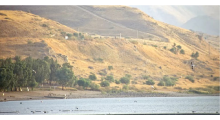 Archaeologists identify the site where Lord Jesus exorcised the legion of demons and the herd of pigs
Archaeologists identify the site where Lord Jesus exorcised the legion of demons and the herd of pigs  The Fifth International Congress of the Commissaries of the Holy Land kicks off, November 19
The Fifth International Congress of the Commissaries of the Holy Land kicks off, November 19 

